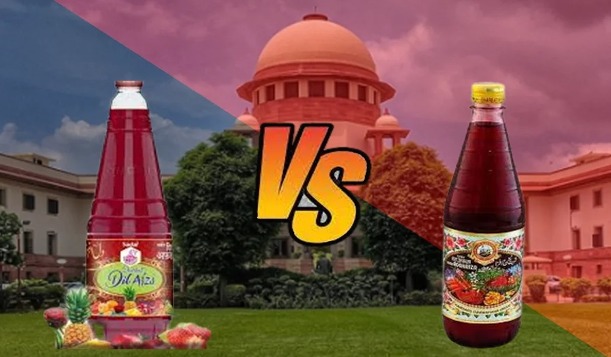
The Supreme Court on Wednesday dismissed an appeal filed against a Delhi High Court order that barred the manufacturers of a sharbat called ‘Dil Afza’ from selling the product after the Hamdard Foundation filed a trademark infringement suit alleging that it was deceptively similar to its ‘Rooh Afza’ product.
While dismissing the appeal, a Bench comprised of Chief Justice of India (CJI) DY Chandrachud, Justices PS Narasimha and JB Pardiwala observed that the High Court’s order was correct and that it would not interfere.
“Rooh Afza has a well-established reputation throughout India, and then you sell certain medicines, and then you start selling Sharbat in 2020…The Division Bench was correct…We will not become involved. Dismissed,” the Court held.
During the hearing, Justice Narasimha inquired as to what difference it would make if one asks for Rooh Afza but received Dil Afza instead.
“This drink is century-old, and it has acquired a character…a structural phonetic and visual mark must be compared as a whole…The Division Bench of the High Court discovered circular rings in a bottle that revealed dishonest intentions…They have been selling since 2020, but we have been selling since 1907…this appears to be a variation of Rooh Afza…They’re riding on my goodwill,” the counsel representing Hamdard responded.
The Hamdard Foundation had moved before the Delhi High Court, claiming that the sale of another sharbat called Dil Afza (made by Sadar Laboratories) is deceptively similar to Rooh Afza and that the defendants have infringed on its trademark since the words ‘Dil’ and ‘Rooh’ have similar connotations.
It was also said that the bottles used to sell the two goods are similar.
In its order last year, the High Court stated that there was an obvious connection between the words ‘Rooh,’ which means soul, and ‘Dil,’ which means heart.
“It is thus not difficult to imagine that a person looking at the label of DIL AFZA may recall the label of ROOH AFZA because the word ‘AFZA’ is common and the meanings of the words ‘ROOH’ and ‘DIL’, when translated in English, are commonly used in conjunction,” the Court stated.
In doing so, the Bench set aside an order of a single-judge’s decision to dismiss an action filed by Rooh Afza makers seeking an injunction on the sale of Dil Afza.




